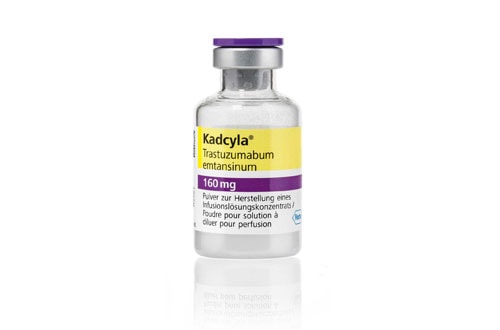
Draft guidance from the UK’s National Institute for Health and Care Excellence (NICE) has concluded that Roche’s breast cancer drug Kadcyla is not sufficiently effective to justify its cost to the NHS.
Kadcyla (trastuzumab emtansine) has “some evidence of clinical efficacy”, according to the draft, but at around £90,000 ($150,000) per patient “is not effective enough to justify the price the NHS is being asked to pay”.
The drug is an antibody-drug conjugate (ADC) that is a follow-up to Roche’s big-selling Herceptin (trastuzumab), and being appraised by NICE as a second-line treatment option for people with advanced HER2-positive breast cancer.
“We had hoped that Roche would have recognised the challenge the NHS faces in managing the adoption of expensive new treatments by reducing the cost of Kadcyla to the NHS,” commented Sir Andrew Dillon, NICE’s chief executive.
Kadcyla is being funded for some patients in England via the government’s Cancer Drugs Fund, but there is no guarantee this will be extended beyond its current expiry in 2016, and Roche is now under pressure to reduce the cost of the drug.
“We hope the manufacturer will act in the best interests of patients and use this consultation period to look again at their evidence and consider if there is more they can do,” said Sir Andrew. Kadcyla was launched in the UK in February after being approved by the European Medicines Agency (EMA) last year.
Emma Pennery, clinical director of Breast Cancer Care, said: “It’s extremely disappointing news for those living with advanced breast cancer and their families that yet another treatment has not been recommended by NICE.”
“Kadcyla can mean those facing limited treatment options live longer and with fewer severe side effects, such as being sick, vastly improving their quality of life,” she added. Clinical data suggests Roche’s drug could extend life by up to six months compared with the combination of Xeloda (capecitabine) – also sold by Roche – and GlaxoSmithKline’s Tykerb (lapatinib).
NICE has rejected eight consecutive treatments for advanced breast cancer since 2011, according to Roche. The general manager of Roche Products in the UK, Jayson Dallas, said the company is “extremely disappointed that NICE has failed to safeguard the interests of patients with this advanced stage of aggressive disease”.
The news is a further blow to the prospects for Roche’s HER2-targeting franchise in the UK. The company is facing the threat of biosimilar competition to Herceptin later this year and had its Perjeta (pertuzumab) breast cancer drug rejected by NICE in draft guidance published in 2013.
NICE is taking comments on the draft guidance until May 19.




